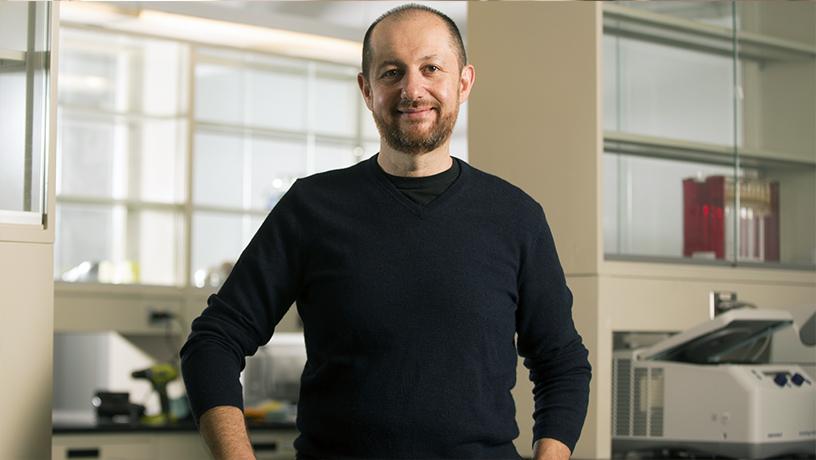Oleg Gang Named a 2024 Vannevar Bush Fellow
Department of Defense award will support Gang’s project to explore a functional nanomaterial discovery and fabrication approach using a new concept of evolving materials.

Columbia Engineering’s Professor Oleg Gang has been named a 2024 Vannevar Bush Fellow, the Department of Defense’s (DoD) most prestigious single-investigator award. The $3 million five-year fellowship will support Gang’s project to establish a new strategy of evolving materials as a paradigm for creating, discovering, and enhancing functional nanomaterial fabrication. His goal is to push a frontier of self-assembly towards creating materials that can evolve based on the need to improve or enable new properties. Such novel nanomaterials will be applied for targeted functions, from optics to mechanics, from catalysis to signal processing.
Gang is one of 11 scientists and engineers to be given the 2024 Vannevar Bush Faculty Fellowship (VBFF), which is a highly competitive award that funds groundbreaking research with transformative potential. Named after Vannevar Bush, who played a large role in shaping the defense research enterprise as the director of the Office of Scientific Research and Development after World War II, the fellowship encourages high-risk, out-of-the-box ideas where researcher creativity intersects with the unknown.
Gang, a professor of chemical engineering and of applied physics and materials science at Columbia Engineering, directs the Soft and Bio Nanomaterials group at Columbia and the Center for Functional Nanomaterials at Brookhaven National Laboratory.He is particularly interested in advancing self-assembly as a design tool for creating complexly organized nanomaterials. Conventionally, the discovery and fabrication of materials are based on exploring large parameter spaces associated with material composition, structure, and processing conditions. Even for the desired material functions based on computed design, the practical realizations of targeted materials can be challenging due to the need to navigate in this large parameter space. The situation becomes even more difficult if theoretical models cannot predict the material design. In this respect, unlike abiotic materials, biological organisms solve the challenge of finding the “good enough” solution through the diversification of species, selection of best performers, and their mutation toward improvement through selection and adaptation.
Gang plans to apply this nature-developed approach to several classes of engineered material systems with optical, mechanical, and chemical functions. However, since there is no nature-created biological machinery for abiotic materials, he will establish in this project an evolution-based approach to create and perfect them according to the desired functionality. By leveraging self-assembly principles with architecture design and its performance, he will develop the foundations of a material evolution strategy and its practical implementation that can address challenges very difficult to solve using traditional fabrication.
A major challenge for self-assembly is the ability to arrange components of different types into rationally designed architectures, which is key to enabling many functions of nanosystems. Gang is working to establish experimental methods for creating designed nanomaterial systems using this approach with the goal of integrating nanoparticles, biomolecules, and polymers into unified systems to take advantage of their unique properties, and to exploit the emergent phenomena.
The new VBFF project will explore principles of material evolution in DNA-programmable systems, where DNA strands can direct the formation of materials from inorganic nanoparticles and proteins, aiming to create new mechanical and optical metamaterials and chemically active matrices. By developing methods for generating and selecting high-performing material species, Gang’s team hopes to establish a guided evolution process for materials, akin to biological evolution
The VBFF funding will enable Gang to develop experimental platforms and algorithms for material evolution processes. The research aims to improve the performance of enzymatic nano-reactors, mechanical metamaterials, and nanomaterials for diverse optical applications.
Related: Research from the Gang lab
Nano-objects of Desire: Assembling Ordered Nanostructures in 3-D
